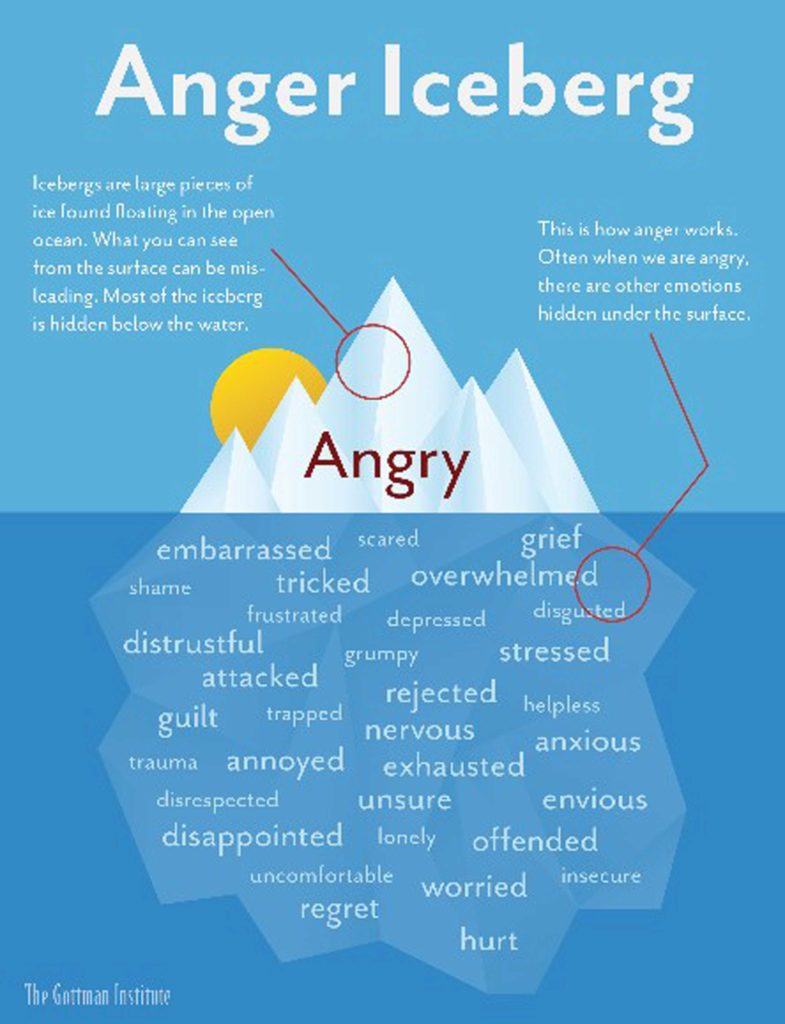Almost every day we encounter someone who is angry – a parent disciplining their child, a teacher reprimanding the class, or even strangers arguing about something like the taxi fare. While it is natural to become angry in certain situations, the anger usually dissipates after. What is not normal is to be angry almost all the time. Irvine Christian Counseling can help individuals address persistent anger and work through its underlying causes in a healthy, constructive way.
Anger is Not Just Anger
Emotions are complex, including anger as seen in this diagram from the Gottman Institute:

When someone is angry, especially if they are always angry, they are not just mad – there may be a host of other feelings affecting them. Anger can come about because of frustration or disappointment in a person or situation in life (e.g. – “My employees are late again!”). Anger may be caused by humiliation by others or shame about oneself (e.g. – “I’m not good enough.”).
It can come about because one was tricked, taken advantage of, or even attacked, making that person feel like a helpless victim (e.g. – “Why me?”). Anger can also be because of envy of others (e.g. – “Why is she always given the easiest tasks?”).
It is because of this complexity that sometimes people do not notice that their family member, colleague or friend is about to explode.
Common Types of Anger Issues
Fortunately for those who are always angry, the condition is quite treatable. But first, it must be recognized for what it is. The following are some types of anger to watch out for.
1. Aggressive anger
Aggression is the usual idea of “real” anger. And what a scary sight that can be! People may bite, kick, punch, shout, stomp, smash, throw, stab, or shoot when they have truly lost control.
 Some people with anger issues have aggressive anger as their natural default stage. When they are angry, they always let the world know (like the Hulk or Wolverine!).
Some people with anger issues have aggressive anger as their natural default stage. When they are angry, they always let the world know (like the Hulk or Wolverine!).
They are the loud and violent ones, willing to pick a fight at the drop of a hat. If not physically, then it may be a very verbal barrage with some things thrown or smashed here and there.
As discussed earlier, there is always something behind the anger (e.g. humiliation, worry, envy, stress) which the show of force or tirade of insults is trying to express. In counseling, the root problem is discussed so the person can learn how to overcome the underlying issue in a healthier way. When verbally rationalized, it becomes easier for the person to understand and then control their anger, preventing unwanted circumstances.
2. Silent and invisible anger
 You have probably met somebody who is angry but does not say a thing. In many people’s lives, it could be a father figure or even a teacher who you can clearly tell was not happy with the situation but they chose not to react in the usual “angry way”. This is silent and invisible anger.
You have probably met somebody who is angry but does not say a thing. In many people’s lives, it could be a father figure or even a teacher who you can clearly tell was not happy with the situation but they chose not to react in the usual “angry way”. This is silent and invisible anger.
For some people with anger issues, their anger is not always seen. They may be very angry indeed but they do not say a word. But though no outburst is given, their anger is deeply experienced at the internal level.
It’s why people sometimes say that their “blood is boiling.” It is because this very intense emotion is causing them to feel very upset and uncomfortable, yet they are doing their best to contain it, like a lid on a pot of boiling water.
In counseling, when someone is always quietly angry, the counselor tries to give that “silence” a name. Is it because of humiliation? Fear? Insecurities? From who? From what event?
 It is good if the problem is being discussed as it is one way for anger to be expressed. Because if anger is not discussed, then the question is: How is the anger being released? Like that pot of boiling water, if the steam is not released safely, things may end in a very big, painful mess.
It is good if the problem is being discussed as it is one way for anger to be expressed. Because if anger is not discussed, then the question is: How is the anger being released? Like that pot of boiling water, if the steam is not released safely, things may end in a very big, painful mess.
This is often the shocking situation as even the most unassuming of people can go berserk (sometimes murderously so!) when they have reached their breaking point.
3. Self-focused vs. Others-focused Anger
One final issue to consider, whether a person is naturally aggressively angry or silently angry, is that of self-focused anger versus others-focused anger.
Many believe that self-focused anger is just depression that a comedic movie and some drinks with friends can overcome. But when looked at deeply, that person may really be angry at themselves in some way. If negative thoughts about their self-worth persist (e.g. – I’m useless! I’m worthless!), then ideas about suicide may surface as the self-hate has reached a point of no return.
 Others-focused anger is the opposite of this. As a person’s anger towards another keeps building up, it may reach a point where the death (homicide) of that other may seem justified (in their eyes of course). The root of this anger may again be any combination of negative feelings that can no longer be contained by the angry person.
Others-focused anger is the opposite of this. As a person’s anger towards another keeps building up, it may reach a point where the death (homicide) of that other may seem justified (in their eyes of course). The root of this anger may again be any combination of negative feelings that can no longer be contained by the angry person.
Again, counseling is needed immediately to ensure that such breaking points are not reached.
Get Help for Your Anger Issues
Be angry and yet do not sin; do not let the sun go down on your anger. – Ephesians 4:26-27
Anger itself is not a bad emotion. It is a natural part of every person. When directed in the right way, it can be used for personal survival or for the good of others (righteous anger!). But when anger is unchecked and uncontrolled, it can definitely hurt the people around.
Counseling is needed to defuse the anger by discovering the underlying issues and then allowing the problems to be rationalized. If you or someone you know is having difficulty with anger, seek help soon. If done early, much can be done to prevent very regretful incidents. Irvine Christian Counseling is here to provide the support and tools needed to address and manage anger in a healthy, productive way.
“Angry Adult”, Courtesy of Pixabay.com, CC0 License; “Plastic Face”, Courtesy of Splitshire, Splitshire.com, CC0 License; “Man in Shadow”, Courtesy of Roman Carey, Pexels.com; CC0 License; “Patience”, Courtesy of Umit Bulut, Unsplash.com, CC0 License
-
Kate Motaung: Curator
Kate Motaung is the Senior Writer, Editor, and Content Manager for a multi-state company. She is the author of several books including Letters to Grief, 101 Prayers for Comfort in Difficult Times, and A Place to Land: A Story of Longing and Belonging...
DISCLAIMER: THIS ARTICLE DOES NOT PROVIDE MEDICAL ADVICE
Articles are intended for informational purposes only and do not constitute medical advice; the Content is not intended to be a substitute for professional medical advice, diagnosis, or treatment. All opinions expressed by authors and quoted sources are their own and do not necessarily reflect the opinions of the editors, publishers or editorial boards of Irvine Christian Counseling. This website does not recommend or endorse any specific tests, physicians, products, procedures, opinions, or other information that may be mentioned on the Site. Reliance on any information provided by this website is solely at your own risk.





